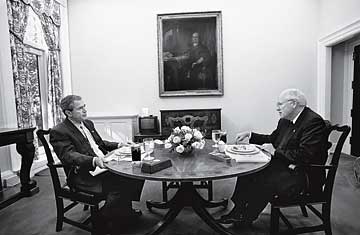
Bush and Cheney, pictured in October 2001, planned the war on terrorism but broke over whether to pardon one of its key architects
(8 of 9)
Two days after that, Libby, who hadn't previously lobbied on his own behalf, telephoned Bolten's office. He wanted an audience with Bush to argue his case in person. To Libby, a presidential pardon was a practical as well as symbolic prize: among other things, it would allow him to practice law again. Bolten once more kicked the matter to the lawyers, agreeing to arrange a meeting with Fielding. On Saturday, Jan. 17, with less than 72 hours left in the Bush presidency, Libby and Fielding and a deputy met for lunch at a seafood restaurant three blocks from the White House. Again Libby insisted on his innocence. No one's memory is perfect, he argued; to convict me for not remembering something precisely was unfair. Fielding kept listening for signs of remorse. But none came. Fielding reported the conversation to Bush.
Meanwhile, Bush was running his own traps. He called Jim Sharp, his personal attorney in the Plame case, who had been present when he was interviewed by Fitzgerald in 2004. Sharp was known in Washington as one of the best lawyers nobody knew. A savvy raconteur from Oklahoma who had represented a long list of colorful clients--from Nixon pal Charles G. (Bebe) Rebozo to Sammy Sosa--Sharp had worked quietly for the President for a while before anyone even knew about it. In the meantime, the two men had become friends, spending hours chatting over cigars and near beer. On the Sunday before he left office, Bush invited Sharp to the executive mansion for a farewell cigar.
While packing boxes in the upstairs residence, according to his associates, Bush noted that he was again under pressure from Cheney to pardon Libby. He characterized Cheney as a friend and a good Vice President but said his pardon request had little internal support. If the presidential staff were polled, the result would be 100 to 1 against a pardon, Bush joked. Then he turned to Sharp. "What's the bottom line here? Did this guy lie or not?"
The lawyer, who had followed the case very closely, replied affirmatively.
Bush indicated that he had already come to that conclusion too.
"O.K., that's it," Bush said.
Their Separate Ways
With one day to go before both men left office, Bush informed Cheney that Libby would not get a pardon. On Inauguration Day, the outgoing Vice President gave a warm tribute to Bush in a private ceremony as the President prepared to leave Andrews Air Force Base for Texas. A day later, Cheney gave an interview to a conservative magazine, saying he disagreed with the President's decision on the Libby pardon. Other Libby backers were quoted in the article, calling Bush "dishonorable" and saying he had left a soldier on the battlefield, language Cheney had used throughout the debate over the pardon. Bush believes that his Vice President was "probably blinded by his personal loyalty to Scooter," a White House aide says. Cheney had pressed the issue as far as he could but finally conceded. "The Vice President knew there was a line out there that he was getting very close to but couldn't cross," says a former senior official. "The President knew that he needed to help make sure that Cheney didn't cross that line either."
